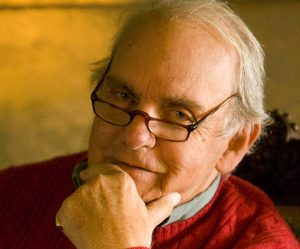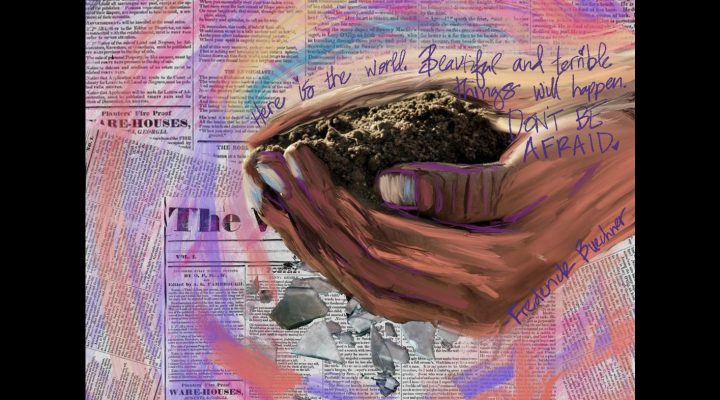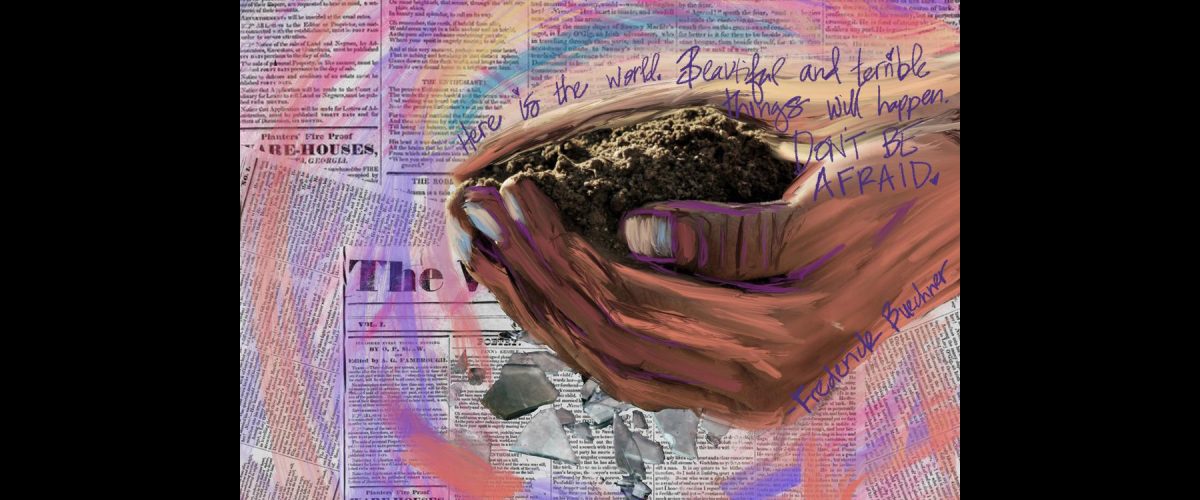One of the most prolific Christian authors and most widely quoted writers of the 20th century died Aug. 15 at age 96.
Only the late C.S. Lewis might have surpassed Frederick Buechner in writings that made their way into sermons and Bible studies coming from the pulpits of mainline Protestants to evangelicals to Roman Catholics of the era.

Frederick Buechner
“Sentence for sentence, he is the best American writer of nonfiction in the 20th century and had a profound influence on many of my dearest friends,” Kenneth Tanner, pastor at Holy Redeemer Church in Rochester Hills, Minn., wrote on Facebook.
“His writings influenced many. I can recall a guest reading his papers and weeping in the reading room,” wrote David Malone, dean of the library at Calvin University and curator of Buechner’s personal and professional papers.
Buechner (pronounced “Beek-ner”) was one of two influential Freds ordained as evangelists by the Presbyterian Church (USA) “who had very different ways of doing outreach than often found in the church,” Malone added. “The other was Fred Rogers.”
While Fred Rogers reached tens of millions of American children through television with his message of kindness, compassion and selflessness, Fred Buechner reached tens of millions of adults with his message of faith despite doubt and hope through grace.
But like Fred Rogers, Buechner spoke most frequently of listening to your life, urging readers to pay attention to God’s constant work in their lives.
Buechner spoke most frequently of listening to your life, urging readers to pay attention to God’s constant work in their lives.
That has resonated deeply with Alan Wright in his work as a hospital chaplain in Dallas. In the third volume of Buechner’s memoirs, Telling Secrets, the author admits that someone had called him out for omitting some of the most difficult times of his life in the first two memoirs. So in Telling Secrets, he wrote about his father’s suicide and his own daughter’s battle with anorexia.
“Buechner talked about how it was a gift from God that our minds are not always able to remember perfectly,” Wright noted. “If we remembered perfectly, we’d never stop grieving. I’ve always remembered that when visiting patients and facilitating groups. I also keep in mind that some of us remember too perfectly and that can make life a struggle.”
Despite his fame, Buechner remained down to earth and was accessible to those who reached out to him. Story after story on social media Aug. 15 told of a pastor or seminarian writing to or calling the author or spending time with him at a conference or retreat.
Thomas Ray Steagald, a former United Methodist pastor in North Carolina, lamented Buechner’s death: “Just yesterday, as I arranged my study, I came across a trove of correspondence between him and me, dating to 1979. I was in seminary. I was in absolute, miserable, potentially self-destructive despair when I found The Alphabet of Grace. Or it found me. That book saved my life, and I wrote him to tell him that very thing. Grace upon grace, he wrote back — two hand-written pages that took me an hour or more (with help!) to decipher. The book also saved my ministry, which I tried to tell him in other ways through the years.”
Tanner, the Minnesota pastor, wrote: “I first discovered him as a freshman in college in 1983 not because he was assigned but rather I suspect that something like providence brought us together. And I say this with complete integrity: The man saved my life.
“I didn’t know anyone who thought so much about the sort of things that animated my interior life and certainly no one who articulated my inner world with the kind of simple eloquence and blood-stained honesty of his resonant voice.”
Thus, “I was stunned the first time I called him and he answered the phone and acted as though someone important had called,” Tanner wrote. “His voice was always patient and welcoming. I have a letter from him during my college years that I treasure that included the question, ‘I wonder what sort of writer you will be?’”
“He wrote the words too personal for others to share, but too honest to be ignored.”
Bobby McKay, pastor of Pleasant Grove Baptist Church in Brookhaven, Miss., summarized Buechner: “He wrote the words too personal for others to share, but too honest to be ignored. The way he crafted words and stories made the reader want to know him and even felt like his story was part of their own.”
Buechner not only was an acclaimed author of 40 books, he was imminently quotable. His stories, his sentences, his thoughts, fit perfectly in sermons.
He wrote of himself: “I find I need to put things into words before I can believe that they are entirely real.”
That process also brought to life the Christian Scriptures as Buechner’s putting “things into words” gave modern-day voice to the holy texts.
“Often, Buechner would work with a Scripture I thought I had already studied thoroughly,” said Charles Qualls, pastor of Franklin Baptist Church in Franklin, Va. “Yet, when he had finished retelling it, I wondered why I hadn’t seen a fraction of the same insightful things.”
It was the powerful witness of another pastor’s words that set Buechner on the path to his unusual form of Christian ministry.
Buechner already was an accomplished author — he began work on his first acclaimed novel while a senior at Princeton — when he found himself in a pew at Madison Avenue Presbyterian Church in New York City, where the legendary pastor George Buttrick one Sunday declared: “Christ is crowned in the hearts of those who love him and believe in him amidst confession and tears and great laughter.”
Buechner later explained: “I was so taken aback by ‘great laughter’ that I found the tears springing to my eyes.”
Those words sparked in him a desire to learn more of Christianity, so he sought counsel from Buttrick, who referred him to nearby Union Theological Seminary. Buechner later wrote that Buttrick made that referral with reservations, telling the young writer, “It would be a shame to lose a good novelist for a mediocre preacher.”
At Union, Buechner studied under Reinhold Niebuhr and Paul Tillich, and he became anything but a “mediocre preacher.”
He was ordained as an evangelist by the same Presbyterian church where he first heard the call that led him to seminary. He founded the religion department at Phillips Exeter Academy before devoting himself full time to writing. Even then, he continued to preach and to lecture at schools including Harvard and Yale, and he held teaching positions at Tufts University, Calvin College and Wheaton College.
The legacy of Buechner’s words carries beyond his death — especially in the countless clergy who have heard the voice of God’s call through his writing.
The legacy of Buechner’s words carries beyond his death — especially in the countless clergy who have heard the voice of God’s call through his writing.
“I was introduced to Buechner while I was in college,” said Darren DeMent, associate pastor at Wilshire Baptist Church in Dallas. “That introduction came at a time when I was deep in the throes of trying to figure out what direction I was going to go in life — trying to discern my vocation, but I didn’t have that language at my disposal yet. Reading Buechner gave me that language.”
Andrew Daugherty, pastor of Pine Street Baptist Church in Boulder, Colo., testifies that Buechner was the “secular saint” his 19-year-old evangelical Baptist soul most needed.
“The Alphabet of Grace was the first Buechner book I read in my Introduction to the Spiritual Life course at Belmont University,” he said. “As I contemplated whether or not I’d become a pastor, I read the best career advice I’ve gotten to date. I’ll never forget reading his words originally published in that book, ‘I hear you are entering the ministry,’ the woman said down the long end of the table, meaning no real harm. ‘Was this your own idea or were you poorly advised?’
“This was the same story Bill Leonard told with such a professor’s mind and pastor’s heart upon my preview visit to Wake Forest University Divinity School just a few years later. I knew instantly where I wanted to attend seminary. I felt it.
“From Belmont to Bill to Buechner, poorly advised or not, it was one of the best decisions I ever made. It started with Buechner’s response to his own fledgling vocational call: And the answer that she could not have heard even if I had given it was that it was not an idea at all, neither my own nor anyone else’s. It was a lump in the throat. It was an itching in the feet. It was a stirring in the blood at the sound of rain. It was a sickening of the heart at the sight of misery.”
Buechner may have written his own epitaph with these words: “The life I touch for good or ill will touch another life, and in turn another, until who knows where the trembling stops or in what far place my touch will be felt.”
Related articles:
‘Frederick Buechner, meet Mary Lou Wells’ | Opinion by Brett Younger
Celebrating a new generation of ministers overtaken by ‘the call’ | Opinion by Bill Leonard


